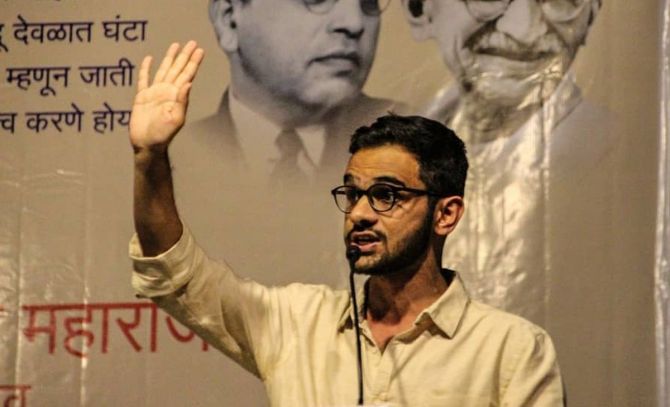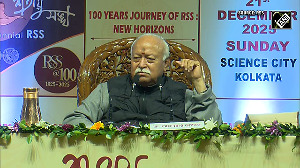Arrested in September 2019 by the Delhi police for making 'provocative statements' when Donald J Trump was on his visit to India, Dr Umar Khalid has now spent three years in jail without being convicted of an offence, points out Aakar Patel.

A few weeks ago, I wrote a letter to Umar Khalid in jail. It read as follows:
'Dear Umar,
It is with admiration that one sees you, and the dignity with which you have conducted yourself in this period, and before it. Your persecution is an emblem of what is being called New India (not much of it is new, of course, other than the nakedness of what is being done and who it is being done to).
Emblematic in the sense that many feel strongly about you and think you personify, as few others do, what is happening around us.
Calls for your release result in a large number of insulting, abusive and often fallacious comments. This is true.
However there are always an equal and perhaps even a larger number of people who offer solidarity and understanding. This is anecdotal, but has happened often enough and consistently enough for it to be considered data of some sort.
While none of us can fully comprehend your position, one hopes that you can derive some warmth from this.
There are many who were and remain with you. Along with your family, we have followed your case and its hearings and felt strong emotion for what has happened and how (LiveLaw and Bar & Bench ran detailed commentary).
The quality of your defence team has been exceptional and (Trideep) Pais was magnificent. Perhaps this might also be something to take sustenance from.
History tells us that movements and ideologies that are intense and fierce begin to come apart as their waves keep pounding the same space.
Tides turn, as they say. It appears, and one is confident one is not being overly delusional in thinking this, that this is happening now.
I have more than hope for how the next 10 months unfold for all of us, but particularly for political prisoners.
My best wishes and my love
Aakar'
I have known him for some years now, and he has been good enough to come to some of the meetings held by Amnesty International India.
It is hard to think of anyone who has been more demonised than he has, both by the government and its machinery and the media, which is also in New India part of the machinery.
A few weeks ago, Amnesty India tweeted: 'Umar Khalid has been in jail without a trial for 1000 days. He was arrested under India's draconian anti-terror law simply for peacefully expressing his opinions. He must be immediately and unconditionally released.'
This so offended some people that a complaint was filed with Twitter asking that the tweet be taken down.
It wasn't, but the episode shows the acidity that exists against someone whom people know little about and what little they know is force-fed falsehoods.
His friends and colleagues and those of us who know him have tried to speak of the real man, the person who is missing from the wild and fraudulent narratives on him.
Writing in The Wire, Professor Nandini Sundar wrote of him that 'when a Muslim like Umar Khalid crosses boundaries, there is a further panic attack. A young articulate Muslim man who does not wear a skull cap, who is an atheist, who did his PhD from JNU in history on Adivasis in Singbhum is seen as an anomaly in the segregated world the RSS wants to create.
'The attempt is then to reduce him to just one aspect of his identity -- so that whatever else he does or says or writes in the end he must be seen merely as a Muslim, and by extension, violent, anti-national, and a threat to the "Indian mainstream". So dangerous that he has been in jail for three years without bail. It is not surprising that so many of the young people who were arrested for the anti-CAA protests were Muslim students at India's leading universities.'
Arrested in September 2019 by Delhi Police for making 'provocative statements' when Donald J Trump was on his visit to India, Umar has now spent three years in jail without being convicted of an offence.
He is incarcerated because the government of the Narendra Modi continues to oppose his bail.
The case against him may be summarised by merely reproducing the headline of a piece written by Betwa Sharma on him for Article-14.com.
It reads: '1000 Days Without Trial Or Bail For Umar Khalid, Denied Bail Despite False Allegations, Fabrications & Inconsistencies'.
Over time, the BJP has fallen in love with laws that allow it to jail opponents, dissenters (especially Muslims).
In 1954 the party said it would repeal the first amendment to the Constitution that curbed freedom of speech by imposing 'reasonable restrictions'.
This amendment essentially took away freedom of expression because the list of what is seen as a reasonable restriction was far too wide and broad.
The Jan Sangh sensed that it was not something that could be allowed to go unchallenged.
However, after 1954, this demand that the first amendment be repealed and freedom of speech, association and assembly be restored to Indians disappeared from the Jan Sangh manifestos.
Interestingly, the Jana Sangh said it would also repeal preventive detention laws which it said were absolutely in contradiction to individual liberty.
This promise was made repeatedly in the 1950s.
However by 1967 it began to qualify the demand and said that 'care will be taken to ensure that fifth columnists and disruptionist elements are not allowed to exploit fundamental rights'.
In time, the Sangh and BJP became the most enthusiastic champions of preventive detention. When it was in the Opposition for decades, it opposed these same laws.
In 1954, as the Jan Sangh, it demanded that the first amendment be repealed and freedom of speech, association and assembly be restored to Indians.
The party also said it would also repeal preventive detention laws (like UAPA is) which it said were absolutely in contradiction to individual liberty.
However by 1967, it changed its position to where it is today: an opponent of liberty, particularly liberty to the sort of man Umar Khalid is.
Aakar Patel is a columnist and writer and you can read Aakar's earlier columns here.
Feature Presentation: Aslam Hunani/Rediff.com










